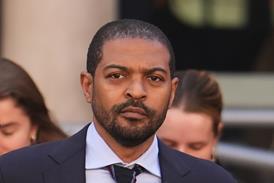Dir: Joseph Cedar. Is. 2007. 120mins
Based on an award-winning, best selling documentary book by journalist Ron Leshem about the last stand of an Israeli unit in Southern Lebanon before their retreat in 2000, Joseph Cedar's painful and highly relevant film adaptation, while not addressing directly last summer's renewed outbreak of hostilities on the same front and its disastrous outcome, inevitably invites the reference to that debacle. Cedar's approach may rub some of its viewers the wrong way, it could eventually be blamed for taking a short-sighted view of a complex situation, but its emotional impact is strong enough to overcome most criticisms and appeal to unbiased audiences both at home and abroad.
A war movie deprived of heroics in which the enemy is never sighted, taking place almost entirely inside concrete fortifications on top of a medieval fortress, Cedar's film could eventually rate as a new version of All Quiet On The Western Front, war viewed from inside the trenches rather than valiant spectacular exploits on the battlefield.
Lacking breathtaking pyrotechnics, larger than life characters, eloquent militant speeches or preachy statements of any kind, it offers a claustrophobic exercise in existential frustration and futility, in which the final act of withdrawal from the front is viewed as a happy ending rather than a sign of defeat.
Not the kind of climax appreciated by multiplex crowds but eminently suitable for more thoughtful audiences. This kind of audiences may be difficult to find in a world polarized and conditioned by the mass media, and this may finally be the film's main challenge, but once met, could lead it to a respectable career.
The Beaufort Castle, built by the Crusaders in the 12th century, is an ideally positioned fortress, sitting on top of a mountain and dominating large parts of what is today Southern Lebanon.
In the past a highly valuable strategic post, its usefulness in modern war is more debatable and the Israeli decision to conquer it in the first place, once they entered Lebanon in 1982, was less than unanimous.
Eighteen years later as their forces, under heavy pressure from public opinion at home and abroad, were withdrawing behind the international border, the Beaufort remained their last stronghold inside Lebanon, manned by a handful of soldiers, who could be reached either by land through a dangerously unprotected road or by helicopters, mostly at night.
Ron Leshem's original book combined the stories of the soldiers who served there at the time, waiting for the imminent order that would allow them to return home and the script he wrote with Cedar remains essentially faithful to these testimonies, though some names and details have been changed in the adaptation.
The cumulative effect of drudge, fear, purposelessness and impotence, is transmitted through the daily routines of the soldiers whose only role is to stay alive the best they can and prevail until allowed to leave.
Any type of counter-attack, at this point in time, with the war practically over, was no longer an option.
A few incidents stand out, like the attempt of an explosives specialist, Ziv (Ohad Knoller, who played a similar part in Yossi And Jagger), to defuse a mine blocking the supply route; part of the fortress being blown to smithereens by a direct hit and killing one of the soldiers, Zitlawy (Itay Turgeman); the young, inexperienced lieutenant, Liraz (Oshri Cohen), hesitating to pull in his friend Oshri (Eli Eltonyo) left wounded under enemy fire; and finally, the preparations for and the retreat itself, culminating the moment the entire Beaufort is blown up before departure.
But as important and skillfully directed as these episodes are, these are highlights helping to intensify the general effect, that of a pointless and tragedy which makes no sense.
Cedar, whose talent for understatement has been amply displayed in his previous Campfire (unveiled in the Forum a couple of years ago), keeps the proceedings on a low but intense burner, never indulges in grandstanding and, with one exception, consistently ignores the spectacular Beaufort landscape.
There is no respite from the stifling air of the underground labyrinths and the sound of the pounding mortar fire, the color palette moves mostly between dark grey and light grey and the heavy-duty battle gear they practically never take off, deglamorized even the best looking of the protagonists.
Performances are restrained and held back, which does not prevent each character from being effectively profiled, from Liraz' insecurities as an officer whose capacities don't quite match his ambitions, to Ziv's fatalism facing a mine that might go off any minute, or Koris (Itay Tiran, one of the hottest actors in Israel today), the introverted, silent type who may well be the alter ego of the author himself.
Neither a pro or anti-war movie, as some people might expect to see at this time coming out of Israel, Cedar's position seems to be that war is a sort of inevitable evil, its reasons aren't discussed at any point, but the way it is being waged verges on criminal.
Not everybody will agree with these views, but to his credit, Cedar, in the spirit of Anthony Mann at the time, does not talk about war, but about Men at War, and he does it with the kind of humanity, compassion and understanding that transcends politics.
Production companies/backers
Movie Plus
Metro Communications
United King Films
International sales
Bavaria Film
Producers
David Mandil & David Silber
Executive producers
Moshe & Leon Edery
Screenplay
Ron Leshem & Joseph Cedar from novel by Ron Lehsem
Cinematography
Ofer Inov
Editor
Zohar M. Sela
Production design
Miguel Merkin
Music
Ishai Adar
Main cast
Oshri Cohen
Itay Tiran
Eli Eltonyo
Ohad Knoller
Itay Turgeman
Arthur Faradjev
Itai Szor
Gal Friedman
Alon Aboutboul
Danny Zahavi
Daniel Bruk
Ygal Reznik
Hannan Yishai
Ami Weinberg
Zohar Shtrauss
Nevo Kimchi






















No comments yet